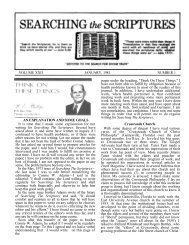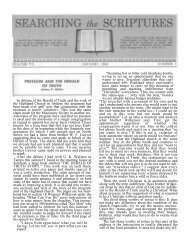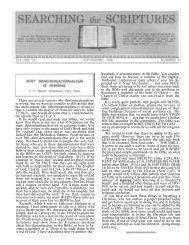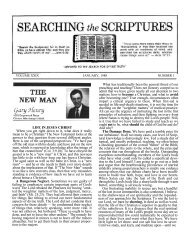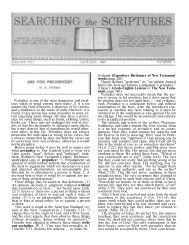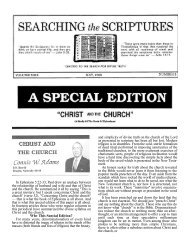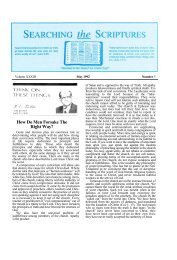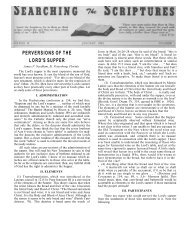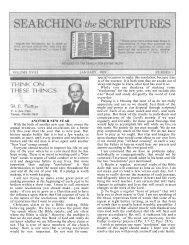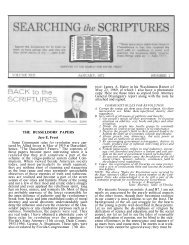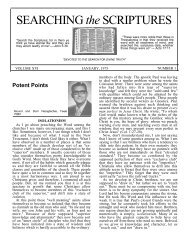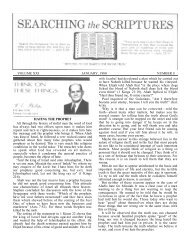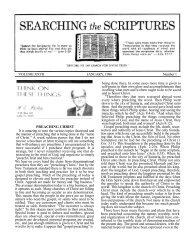Volume 31 – 1990 (PDF) - Searching The Scriptures
Volume 31 – 1990 (PDF) - Searching The Scriptures
Volume 31 – 1990 (PDF) - Searching The Scriptures
Create successful ePaper yourself
Turn your PDF publications into a flip-book with our unique Google optimized e-Paper software.
Page 12____________________________________________________________________________________________________<br />
quoted by Johnny Stringer in With All Boldness, May<br />
1975).<br />
<strong>The</strong> Christian who socially drinks and influences<br />
others is not guiltless. Jesus said, "But whoso shall<br />
offend one of these little ones which believe in me, it<br />
were better for him that a millstone were hanged about<br />
his neck, and that he were drowned in the depth of the<br />
sea. Woe unto the world because of offences! for it must<br />
needs be that offences come; but woe to that man by<br />
whom the offense cometh" (Matt. 18: 6-7)!<br />
Arguments Made To Justify Social Drinking<br />
Believe it or not there are a few Christians who<br />
endeavor to uphold their practice of social drinking by<br />
the Bible. <strong>The</strong>y think that not only did the Lord approve,<br />
but even suggested that we should drink alcoholic<br />
beverages.<br />
1. Some contend that the story of Jesus turning water<br />
into wine (John 2: 1-11) proves that he approved of<br />
drinking alcohol.<br />
<strong>The</strong> word that is translated "wine" does not inherently<br />
mean fermented wine. While it can include that<br />
(which is determined by context e. g. Eph. 5: 18), it is<br />
also used to refer to unfermented juice of the vine. Mark<br />
2: 22 and Matt. 9: 17 refer to the fermentation<br />
process. <strong>The</strong> practice was to put new wine<br />
(unfermented) into new bottles (of skin) which would<br />
stretch with fermentation. If new wine were put in old<br />
bottles (already stretched), the bottle would burst and<br />
the wine be lost. <strong>The</strong> point to be seen is that the Lord<br />
uses the same word "wine) (also the same word in<br />
Greek) that he used in John 2 to refer to unfermented<br />
wine (grape juice). Thus, it is an as-sumption that the<br />
term "wine" in John 2 means that the Lord turned water<br />
into an alcoholic beverage. <strong>The</strong> word "wine" does not<br />
suggest that at all! <strong>The</strong> problem may be that we do not<br />
use the term "wine" in that sense today. However, in<br />
the Old Testament that term describes the juice that is<br />
still in the cluster (Isa. 65: 8).<br />
In Luke 1: 15 "wine" is put in contrast to "strong<br />
drink, " which means it was either pure grape juice or a<br />
drink that had far less alcoholic content than their<br />
"strong drink" of the day which contained 5%-8% alcohol.<br />
If the wine Jesus made was fermented, then we could<br />
easily justify excessive drinking as well as social drinking.<br />
When we consider that there was 100-160 gallons,<br />
"It would seem to prove either: 1. Excessive drinking<br />
was allowable, or 2. <strong>The</strong> oinos in this case was grape<br />
juice. In light of the whole Old Testament condemnation<br />
of wine, it certainly would appear that the beverage<br />
was grape juice" (Joseph P. Free, Archaeology and<br />
Bible History, p. 355).<br />
"It is sometimes objected that this is referred to as<br />
'good wine' (John 2: 10), indicating an alcoholic content.<br />
Upon examination, however, we find no hint that its<br />
goodness was in its high alcoholic content (Harris, BT,<br />
p. 183). Earnest Gordon comments, 'When the creative<br />
hand of the Lord made wine for the guest we maybe sure<br />
that it was superlative even to corrupted tastes... It<br />
isn't likely they would call Christ's wine anything but<br />
good' (SST, 'Note on Open Letters, ' July 22, 1944, p.<br />
514)" (Ibid, p. 355).<br />
2. Some argue from 1 Tim. 5: 23 that Paul encouraged<br />
Timothy to drink alcoholic beverages. Paul said, "Drink<br />
no longer water, but use a little wine for thy stomach's<br />
sake and thine often infirmities. "<br />
Again, the term wine (same word as in John 2) does not<br />
suggest that it was fermented wine. To say that it is<br />
fermented is an assumption!<br />
Furthermore, notice that Timothy was to drink wine<br />
for his stomach's sake and his often infirmities. It was for<br />
medicinal purposes. Thus, if we grant that it was<br />
fermented (alcoholic content) it does not justify social<br />
drinking. It would only justify drinking such for medical<br />
purposes.<br />
3. Several have twisted 1 Tim. 3: 8 which lists "not<br />
given to much wine" as one of the qualifications of a<br />
deacon. It is assumed that it means he can be given to a<br />
little, but just not much. A passage that forbids<br />
excessive- ness (in my matter) does not permit<br />
anything short of that excessive point. Passages that<br />
forbid fornication do not justify anything short of the<br />
overt act. Passages that condemn murder do not uphold<br />
beating a man just as long as we stop short of killing<br />
him.<br />
"It is not affirmed that it would be proper for the<br />
deacon, any more than the bishop, to indulge in the use<br />
of wine in small quantities, but it is affirmed that a man<br />
who is much given to the use of wine ought not, on any<br />
consideration, to be a deacon" (Albert Barnes, comments<br />
on 1 Tim. 3: 8).<br />
Since social drinking cannot be justified by the Bible<br />
and it is plainly condemned by the New Testament, we<br />
can only conclude that social drinking is a SIN!



